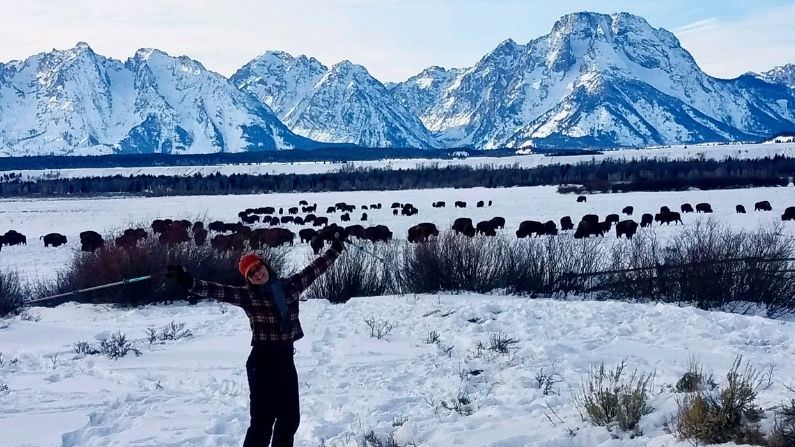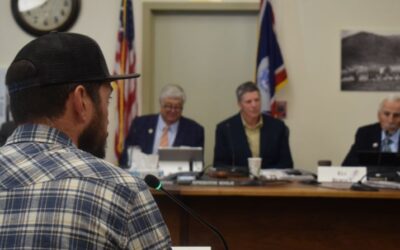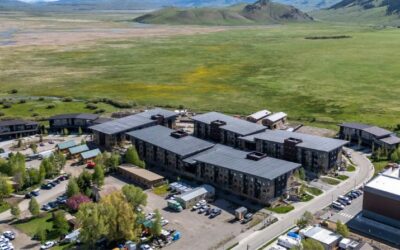Sam Ritchie’s home is steps away from the National Elk Refuge. And it has everything she needs: A bedroom, kitchen and sitting area.
“It’s wonderfully cozy,” she said. “It’s hilarious because I work on log cabins all day and come to live in one every night.”
Ritchie first took a job with the National Park Service in the summer of 2017 working as a backcountry ranger in Yellowstone National Park. It was isolating work–grocery trips meant an hour-and-a-half-drive to Jackson. But she loved it anyway.
“I’ve managed to live in incredibly beautiful places and work with my hands most of the day and work outside most of the day,” Ritchie said. “And I kind of realized that that was a priority for me.”
Ritchie’s performed historic preservation work for the park service in western Wyoming for the past few years, and this spring, she’s starting a new full-time position performing trail work for Grand Teton National Park. Last month, there was also a major development that boosted her quality of life outside of work: She moved into a full-time place to live.
“In the last year, I’ve really considered looking at other parks that have more stable housing situations in the surrounding neighborhoods and cities,” she said. “But thankfully, it lucked out that the park was able to offer me housing, and I’m currently living in park housing, which is actually affordable and kind of allows me to exhale a little bit.”
Ritchie said she was displaced four times in two years while navigating market-rate housing in Jackson. Her former landlords sold their properties or jacked up the rents, and tenants in Wyoming don’t have many rights to challenge those decisions.
Grand Teton Superintendent Chip Jenkins said he’s well aware that many of his employees are struggling to find permanent lodging in town right now.
“Unless a person really comes from unusual circumstances and [they] are able to muster the capital to get into the private market, that’s not a choice that is open to our employees,” Jenkins said.
The median home sale price in Teton County eclipsed $4 million this year. Currently, about 14% of the park’s employees choose to live in private housing, Jenkins said. But by 2026, that number will be down to around 5%.
“What’s happening now is that every time we have a turnover in positions—so, for example, we had our chief ranger, who has been a longtime resident in town—when they [our employees] have moved on to other jobs, [like] when we hired our new chief ranger [who] came down from Alaska, she can’t afford to get into the housing market,” Jenkins said. “She, her husband and her son, they can’t afford to rent or to buy. So, we need to be able to provide their housing.”
Jenkins estimates that the park needs 35 new households in the next four years just to retain his current staff, and that’s not accounting for future needs. 3.8 million people visited Grand Teton in 2021, a record amount. So, Jenkins said it’s logical that the park will need to add more staff eventually.
“I think we have a need for more custodians. For more law enforcement rangers,” he said. “Frankly, part of what we need is we need more digital rangers. We need people who are helping in order to be able to provide information to people.”
Grand Teton National Park has a full-time housing officer who maintains current stock, matches employees with rooms and manages any issues that come up. Jenkins is also working with the park service’s headquarters in Washington, D.C., to strategize how to quickly build more units. He said that’s critical not only to keep his organization running, but for the local community as well.
“It’s our responsibility to keep the roads open from Moran down to town. We have mutual aid agreements with the sheriff and the police department and the emergency medical services and the fire department,” Jenkins said. “I think this last year, we responded to over 50 emergency calls just up in Buffalo Valley.”
Speaking in testimony before a Congressional committee in mid-May, National Park Service Director Chuck Sams said he’s asking for additional funding for employee housing in his annual budget, with millions specifically allocated for Grand Teton and other Western areas.
“Median home purchase prices continue to rise throughout the United States and in many of our [national park] gateway communities,” Sams said. “And short-term vacation rental markets are thriving and therefore taking away from our seasonal work staff.”
Beyond more funding, the federal government is also looking into alternative ways to develop. In Maine, lawmakers are proposing a land transfer from Acadia National Park to a local organization so they can build more workforce housing units in the nearby town of Bar Harbor. That’s a difficult strategy under current regulations, but earlier this month, Associate Director of Park Planning, Facilities and Lands for the park service Michael Caldwell told a U.S. Senate committee he’d like to explore options like that more often.
“We’re working with others to try to maybe gain some more flexibilities and authorities that are needed for public-public and public-private partnerships to help us with our housing needs,” Caldwell said.
To that end, two Western members of Congress introduced a bipartisan act last month that would cut red tape around public-private partnerships with the goal of building quickly in gateway communities like Jackson, but it hasn’t gained traction yet.
Meanwhile, Grand Teton is also dealing with another issue connected to the cost of living in Jackson: Employee recruitment. Jenkins said he has about 25 open positions for the summer season, with lodging included, but no candidates to take them.





